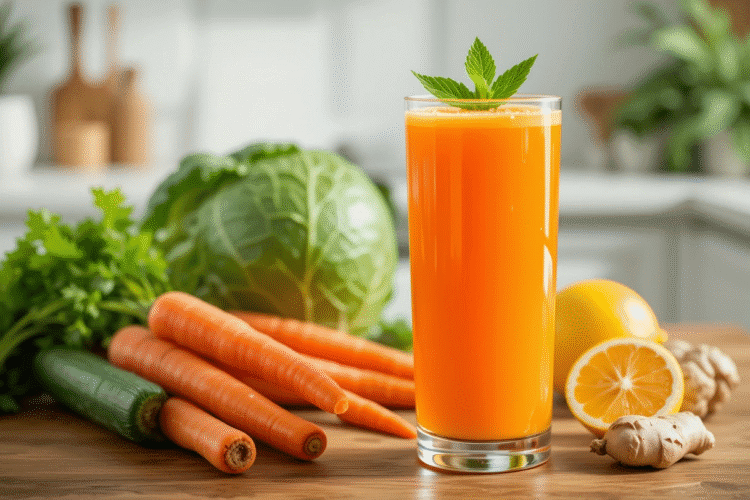Looking to support your weight loss journey with a simple, natural drink? This carrot juice recipe combines fiber-rich vegetables and metabolism-supporting ingredients to create a refreshing, low-calorie beverage that complements a balanced lifestyle. Crafted with input from nutrition experts, this recipe is designed to energize, hydrate, and nourish your body while supporting your wellness goals.
Whether you’re seeking a morning boost or a healthy afternoon snack, this homemade juice is packed with vitamins, minerals, and antioxidants. Below, you’ll find a detailed recipe, science-backed benefits, and tips to make it part of your healthy routine.
Why Choose This Carrot Juice Recipe?
This recipe stands out because it:
- Uses affordable, accessible ingredients
- Requires minimal equipment (juicer or blender)
- Is customizable for dietary needs (e.g., low-sugar, sensitive stomachs)
- Is backed by nutritional science and expert insights
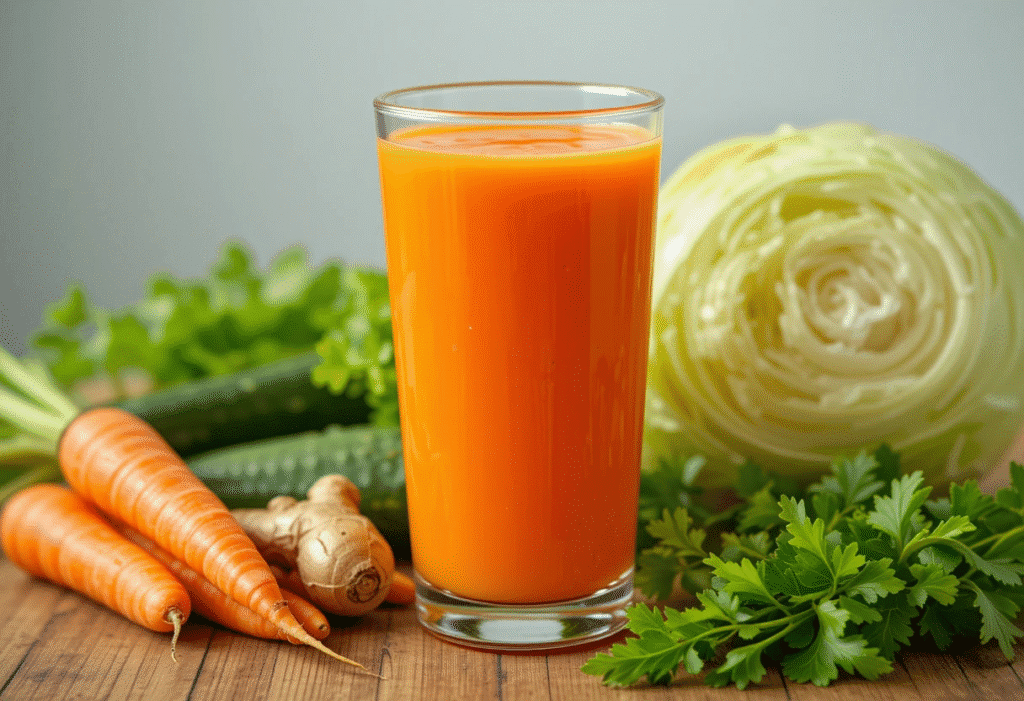
The Complete Carrot Juice Recipe for Weight Loss
Ingredients (Serves 2)
- 6–8 large carrots (washed, peeled, about 1.5 lbs)
- ¼ head of small cabbage (roughly chopped, about 1 cup)
- ½ cucumber (peeled, chopped, about 1 cup)
- 1-inch piece of fresh ginger (peeled)
- Optional: 1 tablespoon fresh lemon juice (for vitamin C and flavor)
- Optional: 4-5 fresh mint leaves (for freshness)
- Optional Substitution: ½ small apple (for natural sweetness, if desired)
Source: Ingredient quantities based on USDA FoodData Central for nutritional accuracy.
Equipment
- High-speed blender or juicer
- Fine-mesh strainer or cheesecloth (if using a blender)
- Airtight glass container (for storage)
- Measuring cups and spoons
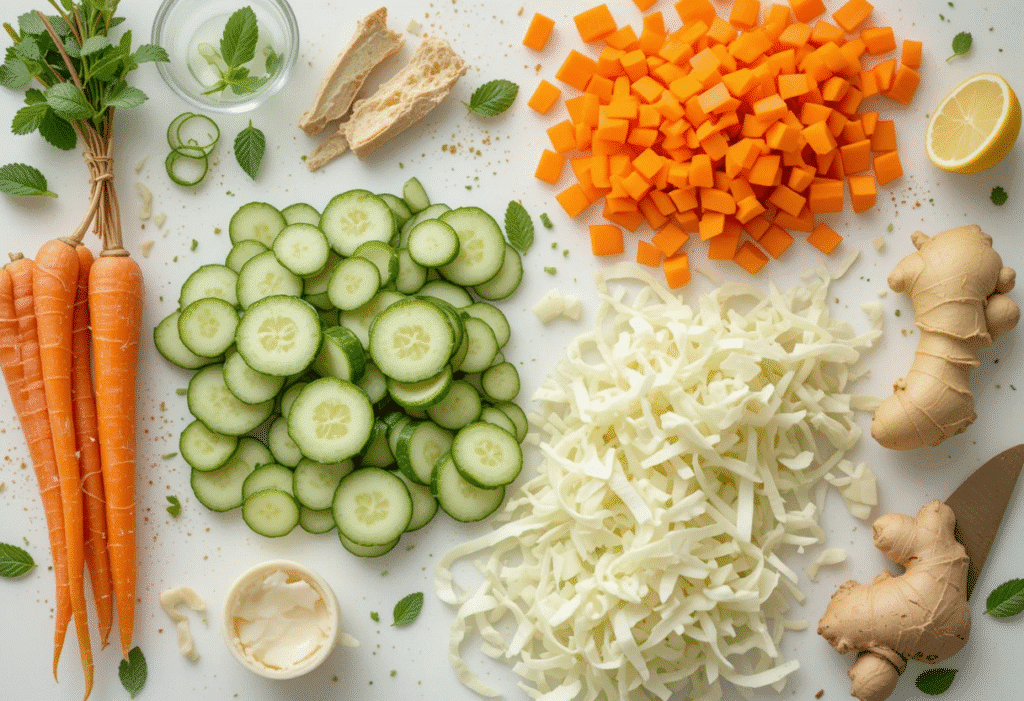
Step-by-Step Instructions
- Prepare Ingredients
Wash all vegetables under cold running water. Peel carrots and cucumber, then chop into 1-inch pieces for easier blending or juicing. Remove outer cabbage leaves and chop roughly. Peel ginger with a spoon or vegetable peeler. - Juice or Blend
- Juicer: Feed ingredients through the juicer, starting with softer vegetables (cucumber, cabbage) and ending with harder ones (carrots, ginger).
- Blender: Add all ingredients with ½ cup water and blend on high for 2-3 minutes until smooth. For budget-friendly blenders, add more water (up to ¾ cup) to ease blending.
- Strain (If Using Blender)
Pour blended mixture through a fine-mesh strainer or cheesecloth into a pitcher, pressing gently to extract liquid. Compost pulp or save for recipes like veggie patties. - Add Final Touches
Stir in lemon juice and mint leaves, if using. These enhance flavor and add antioxidants (NIH on vitamin C benefits). - Serve Fresh
Pour into a glass over ice and enjoy immediately for maximum nutrition. Yield: ~16-20 oz (2 servings).
Prep Time: 15 minutes | Difficulty: Beginner-friendly
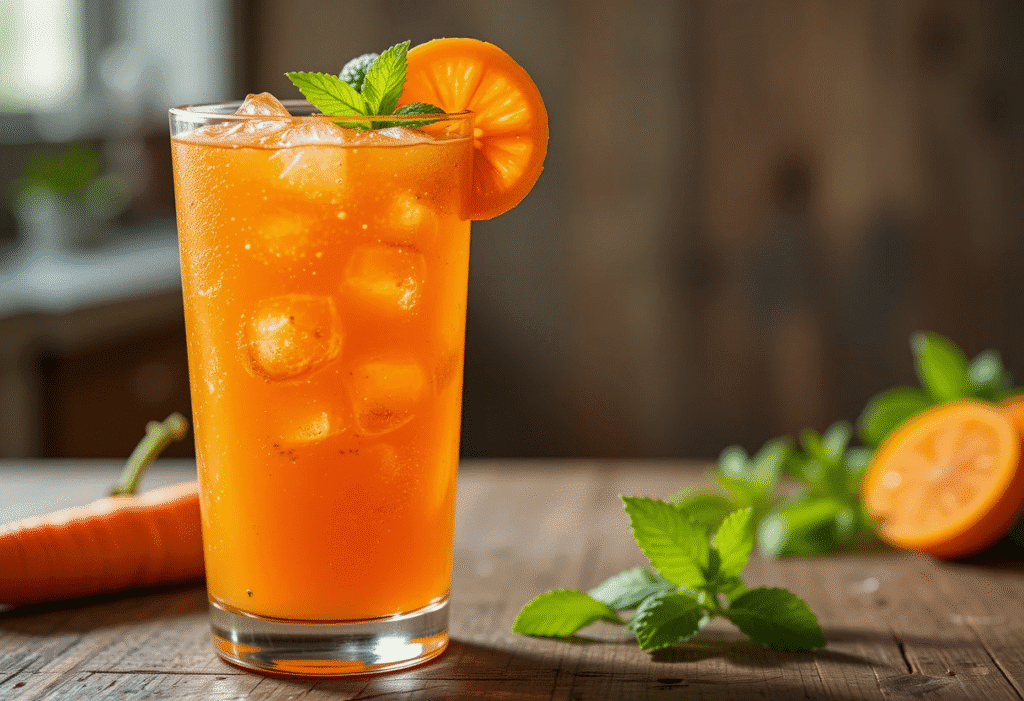
Why This Juice Supports Your Wellness Goals
This carrot juice is a nutrient-dense addition to a balanced diet and active lifestyle. Here’s how each ingredient contributes, backed by science:
Carrots: Fiber and Beta-Carotene
- Benefits: Low in calories (41 kcal/100g) and high in fiber (2.8g/100g), carrots promote satiety, potentially aiding weight management (Journal of Nutrition, 2011). Beta-carotene supports metabolic health and provides natural energy.
- Nutrition: Over 400% of daily vitamin A per serving.
Cabbage: Digestive Health
- Benefits: Rich in antioxidants like glucosinolates, cabbage supports digestion and may reduce inflammation (Food Chemistry, 2014). Its fiber aids gut health, which is linked to weight regulation.
- Nutrition: Provides vitamin C (36mg/100g) and potassium.
Cucumber: Hydration Hero
- Benefits: With 96% water content, cucumbers hydrate without adding calories, supporting metabolism (Harvard Health).
- Nutrition: Low-calorie (15 kcal/100g) and rich in water.
Ginger: Anti-Inflammatory Boost
- Benefits: Gingerol in ginger may enhance thermogenesis and reduce inflammation, supporting digestion and recovery (Phytotherapy Research, 2019).
- Nutrition: Adds minimal calories with bioactive compounds.
Nutritional Profile Per Serving
| Nutrient | Amount | % Daily Value |
| Calories | 85-100 kcal | – |
| Fiber | 6-8g | 20-25% |
| Vitamin A | 400%+ | 400%+ |
| Vitamin C | 25-30mg | 25-30% |
| Potassium | 500-700mg | 15-20% |
| Natural Sugars | 12-15g | – |
Note: Values are approximate, based on USDA FoodData Central. Consult for precise data.
Internal Link: Explore more healthy juice recipes for variety in your diet.
When to Drink This Juice for Best Results
Morning (7-9 AM)
Kickstart your day with this juice on an empty stomach to maximize nutrient absorption and stabilize blood sugar (Mayo Clinic on balanced breakfasts).
Pre-Workout (30-60 Minutes Before)
The natural carbohydrates provide energy, while ginger’s anti-inflammatory properties may aid recovery (Journal of Strength and Conditioning Research, 2010).
Mid-Afternoon (2-4 PM)
Combat energy slumps with this low-calorie, hydrating drink instead of sugary snacks.
Timing Tips
- Drink on a relatively empty stomach for better absorption.
- Wait 30 minutes before eating solid food.
- Avoid late evenings to prevent sleep disruption from natural sugars.
Storage and Meal Prep Tips
Keep It Fresh
Consume immediately for optimal nutrition. If storing:
- Use an airtight glass container in the refrigerator.
- Add a squeeze of lemon juice to preserve freshness.
- Stir before drinking due to natural separation.
- Discard after 24 hours or if you notice off smells, color changes, or fizzing.
Meal Prep Hacks
- Wash and chop vegetables in advance; store in separate containers.
- Juice fresh daily for best flavor and nutrition.
- Freeze chopped ginger in small portions for convenience.
Expert Tips for Maximum Benefits
Optimize Your Routine
- Consistency: Drink 4-5 times weekly as part of a balanced diet.
- Pair with Protein: Follow with a protein-rich snack (e.g., Greek yogurt) to stabilize blood sugar (Harvard T.H. Chan School of Public Health).
- Hydrate: Drink water throughout the day to support metabolism.
- Start Small: Begin with 8 oz to test digestive tolerance.
Avoid Common Mistakes
- Using too much ginger (stick to 1-inch piece for mild flavor).
- Storing juice beyond 24 hours (nutrients degrade).
- Relying solely on juice for weight loss (combine with exercise and diet).
- Ignoring portion control (monitor overall calorie intake).
Customization Options
- Sensitive Stomachs: Reduce ginger to ½ inch.
- Extra Vitamin C: Add ½ red bell pepper (47mg vitamin C/100g).
- Natural Sweetness: Include ½ apple (lowers glycemic impact).
- Detox Support: Add a handful of spinach for chlorophyll and iron.
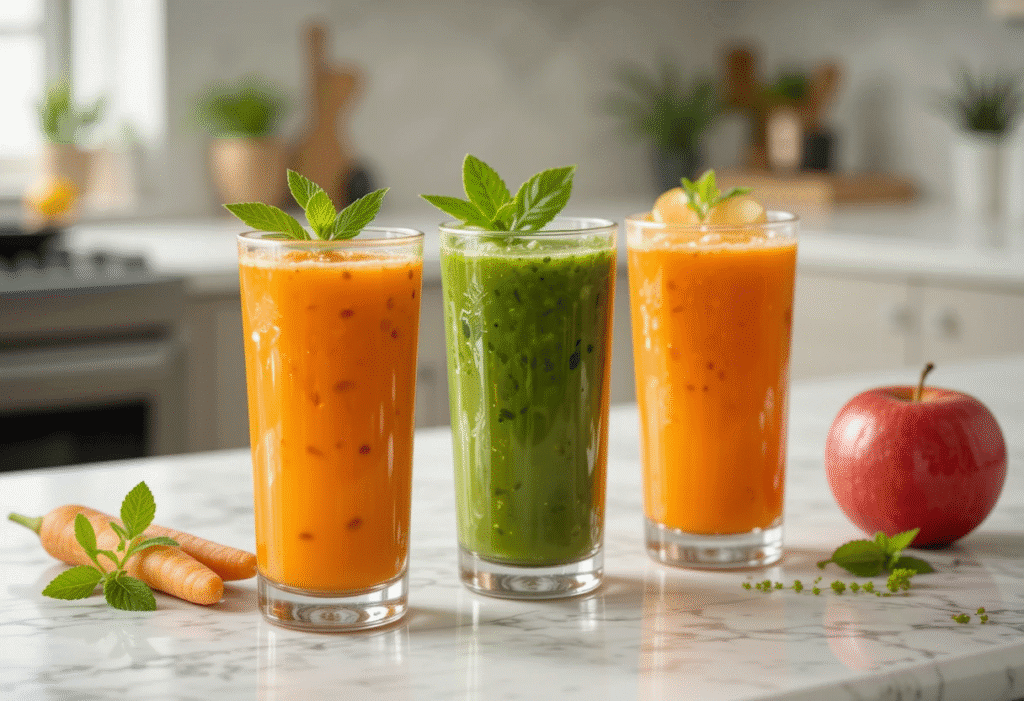
Frequently Asked Questions
How often should I drink this carrot juice recipe?
Enjoy 4-5 times weekly for variety and balance. Consult a dietitian for personalized advice.
Can I make it without a juicer?
Yes! Use a blender with ½-¾ cup water and strain for a smooth texture. Budget-friendly blenders work well with extra water.
Can I use canned or frozen ingredients?
Fresh is best, but frozen carrots or cabbage can work if unsweetened and unseasoned. Avoid canned foods due to added sodium.
Will this juice target belly fat?
No single food targets belly fat. This juice supports overall weight loss when paired with a calorie-controlled diet and exercise (CDC Weight Loss Guidelines).
How soon will I see results?
Energy boosts may be noticeable within days, but weight loss requires weeks of consistent healthy habits. Results vary by individual.
Is it safe for children or older adults?
Generally safe in moderation, but consult a pediatrician or doctor for specific needs, especially for children or those with medical conditions.
What if I don’t like cabbage?
Substitute with kale or spinach for similar fiber and antioxidant benefits.
Are there side effects?
High fiber may cause bloating if new to your diet. Start with 8 oz and increase gradually. Consult a doctor if discomfort persists.
Making It Part of Your Lifestyle
This carrot juice is a delicious addition to a sustainable weight loss plan. Combine it with:
- Balanced Diet: Focus on whole foods, lean proteins, and healthy fats.
- Exercise: Aim for 150 minutes of moderate activity weekly (CDC Physical Activity Guidelines).
- Sleep and Stress Management: Prioritize 7-9 hours of sleep and mindfulness practices.
Track your energy, digestion, and mood in a journal to find the best routine for you. Adjust ingredients based on taste or dietary needs for long-term success.

Final Thoughts
This carrot juice recipe is a science-backed, nutrient-packed way to support your wellness journey. Its fiber, hydration, and anti-inflammatory ingredients make it a smart choice for energy and health. Pair it with a balanced lifestyle for sustainable results.
Try this recipe today and share your experience in the comments below! Have questions? Reach out to our team or consult a dietitian for personalized guidance.
Disclaimer: Always consult a healthcare provider before making dietary changes, especially if you have underlying health conditions or are pregnant/breastfeeding.

Carrot Juice Recipe for Weight Loss
Ingredients
- 6 –8 large carrots washed & peeled
- ¼ head of cabbage small, chopped
- ½ cucumber peeled & chopped
- 1- inch piece of fresh ginger peeled
Optional
- 1 tbsp lemon juice for flavor & vitamin C
- 4 –5 fresh mint leaves for freshness
- ½ small apple for natural sweetness
Instructions
- Wash and peel all vegetables.
- Chop carrots, cucumber, and cabbage into small pieces.
- Juicer method: Run all ingredients through the juicer.
- Blender method: Add ingredients with ½–¾ cup water and blend until smooth.
- Strain juice using a fine-mesh strainer or cheesecloth (if blended).
- Stir in lemon juice and mint (optional).
- Serve over ice or chill before drinking.
Notes
- Drink 4–5x/week for best results
- Great as a morning, pre-workout, or mid-day energy drink
- Store in a glass container up to 24 hours (shake before drinking)
